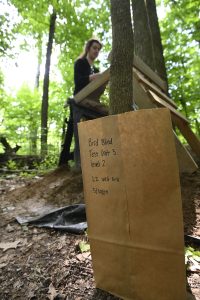The 225-acre woods surrounding Wright State University’s Dayton Campus is home to 110 species of birds, foxes, deer, salamanders and the rare Indiana Bat. Wright State’s Field School in Archaeology hopes to scrape the surface to learn more about the people who lived in the woods before the university was built.
“I’ve been wanting to do a field school in the woods for a long time,” said Lance Greene, Ph.D., professor of anthropology.
Since 2016, Greene has taught Anthropology 4650, the summer Field School in Archaeology that has uncovered buried artifacts from a Revolutionary War battlefield in Clark County, pottery and cooking supplies from the lost city of Osborn, and the foundation and harvesting tools from an almost 200-year-old family farm in Bellbrook that burned to the ground in 1940.
“I love it,” said Greene. “This is probably my favorite class because we are doing archeology.”
This year, the Field School in Archaeology, which trains students to be professional archeologists, doesn’t need to travel far for its dig site. The nine students in the class are exploring the Wright State woods near the green bird blind across from the Creative Art Center entrance.
“The students are learning the language and learning the skills and how to map and excavate,” said Greene.
The group discovered pottery and uncovered a cluster of stones that was used as a rock oven, where, in prehistoric areas, people cooked their food in the ground with heated rocks.

A Wright State University anthropology student uses a sifter to search for artifacts in the campus woods. (Photo by Erin Pence)
“We definitely have found evidence of some campsites and possibly like early era tools,” said Scarlet Coe, a French and anthropology major who worked on a test pit to find artifacts. “We can definitely see that people were here.”
Students record every artifact they find and map the location with high-tech mapping tools. The recorded artifacts are scrubbed and cleaned in the anthropology lab in Allyn Hall. Then students can recreate where the artifacts were in relation to each other.
Greene said people have been living in the area that is now Wright State for almost 10,000 years.
“One of the goals that I have is to actually bring it to people’s attention that this is another important cultural resource in the woods and it should be protected,” he said.

 Walking through open doors
Walking through open doors  Adventures await
Adventures await  Wright State to expand nursing facilities to meet workforce needs and prepare more graduates for in-demand careers
Wright State to expand nursing facilities to meet workforce needs and prepare more graduates for in-demand careers  Wright State student-athletes make a lasting impact on local family with more to come
Wright State student-athletes make a lasting impact on local family with more to come  Wright State names Rajneesh Suri dean of Raj Soin College of Business
Wright State names Rajneesh Suri dean of Raj Soin College of Business 